Pulmonologist Resume Examples

Jul 18, 2024
|
12 min read
Your ultimate guide to crafting a pulmonologist resume: breathe life into your job application with these expert tips. Discover how to highlight your skills, experience, and achievements effectively in the competitive pulmonary care field.
Rated by 348 people
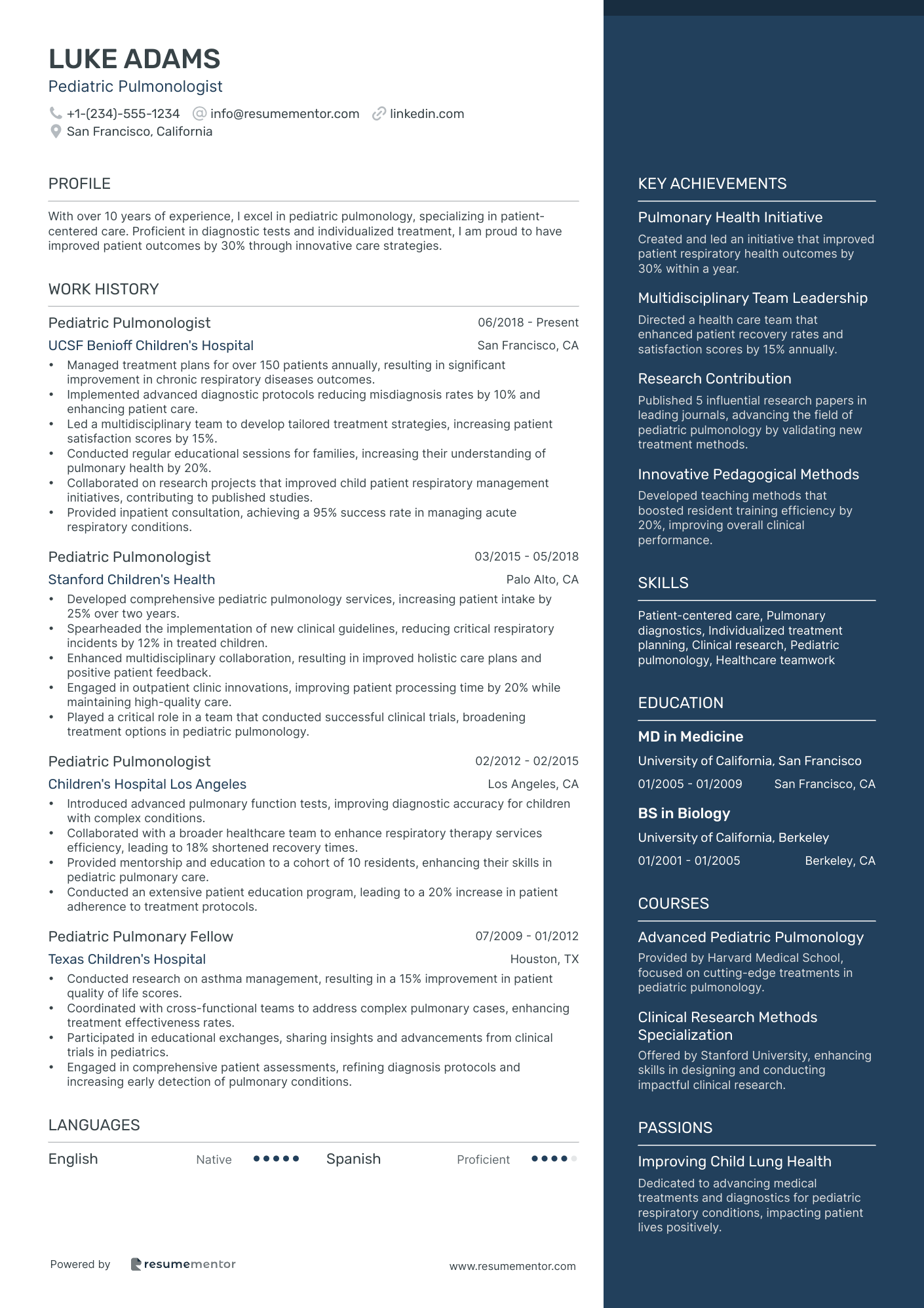
Pediatric Pulmonologist
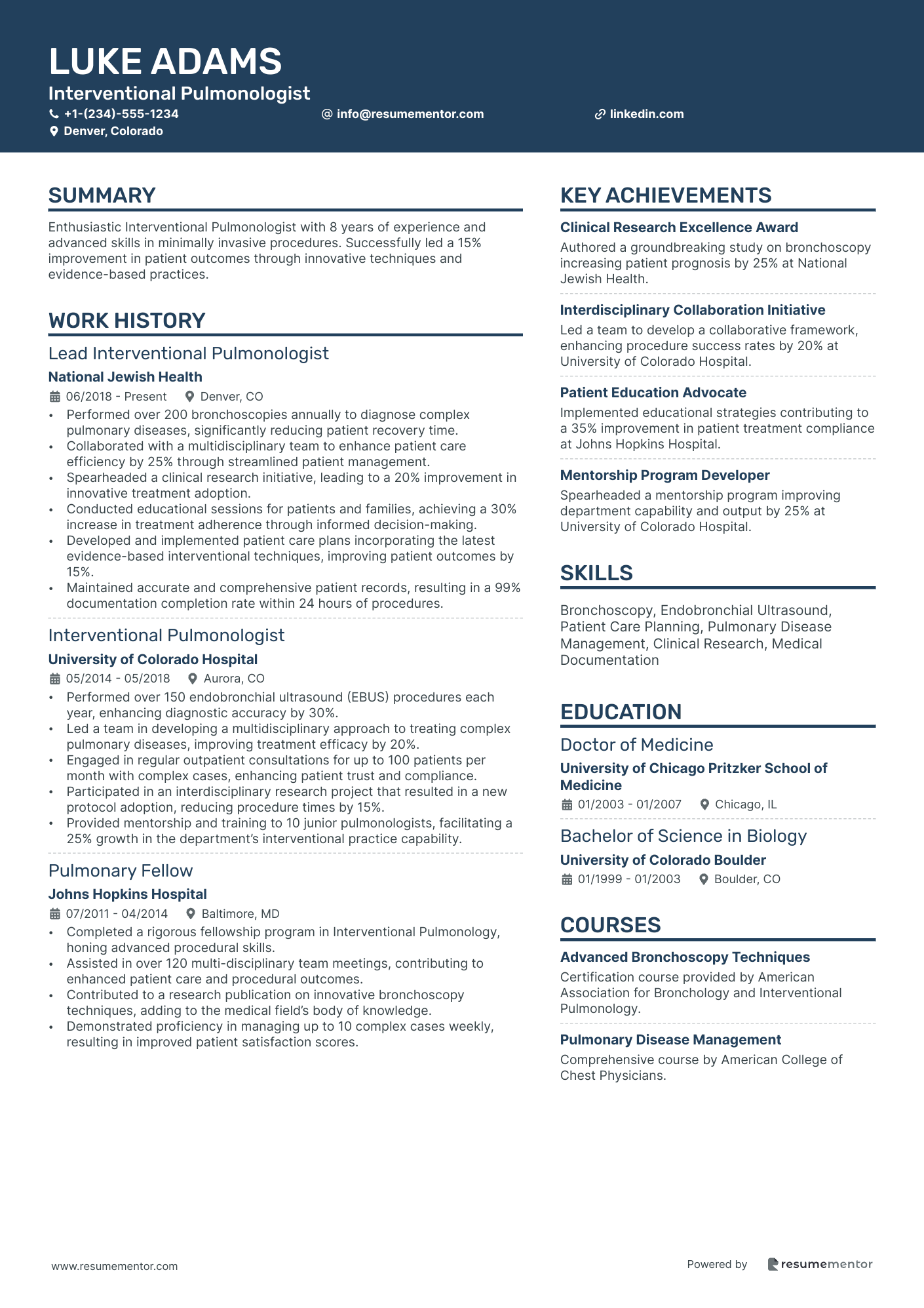
Interventional Pulmonologist
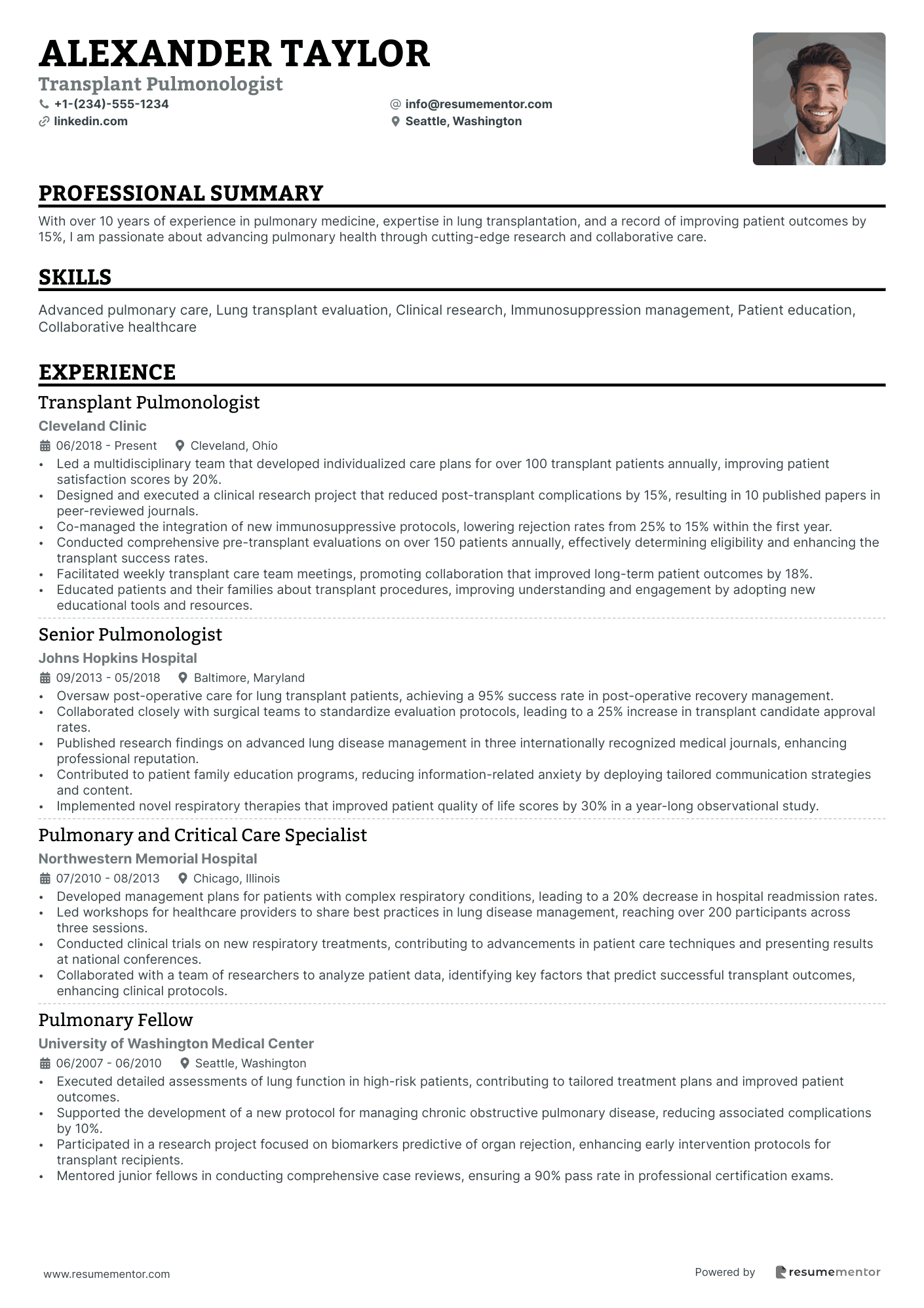
Transplant Pulmonologist
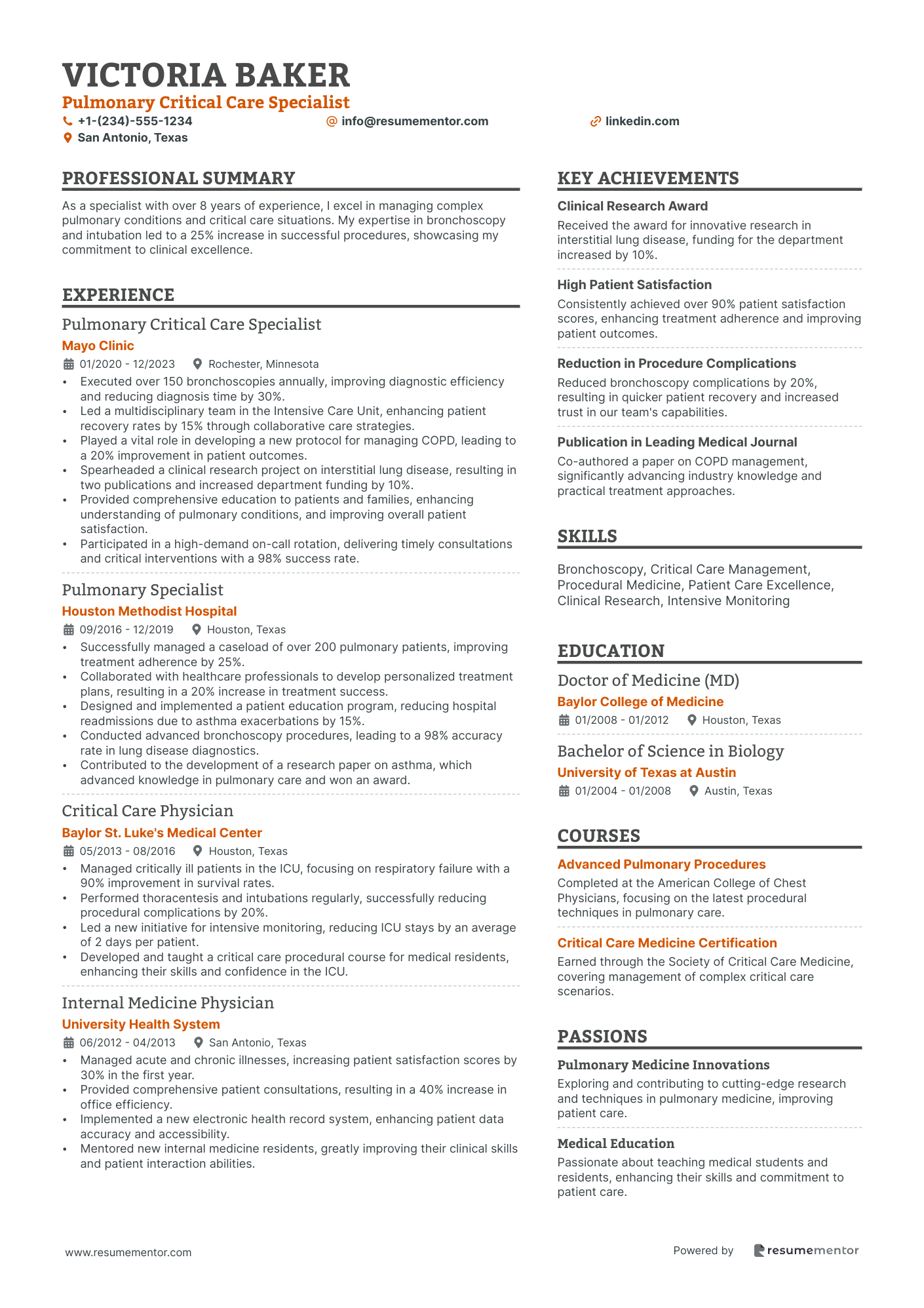
Pulmonary Critical Care Specialist
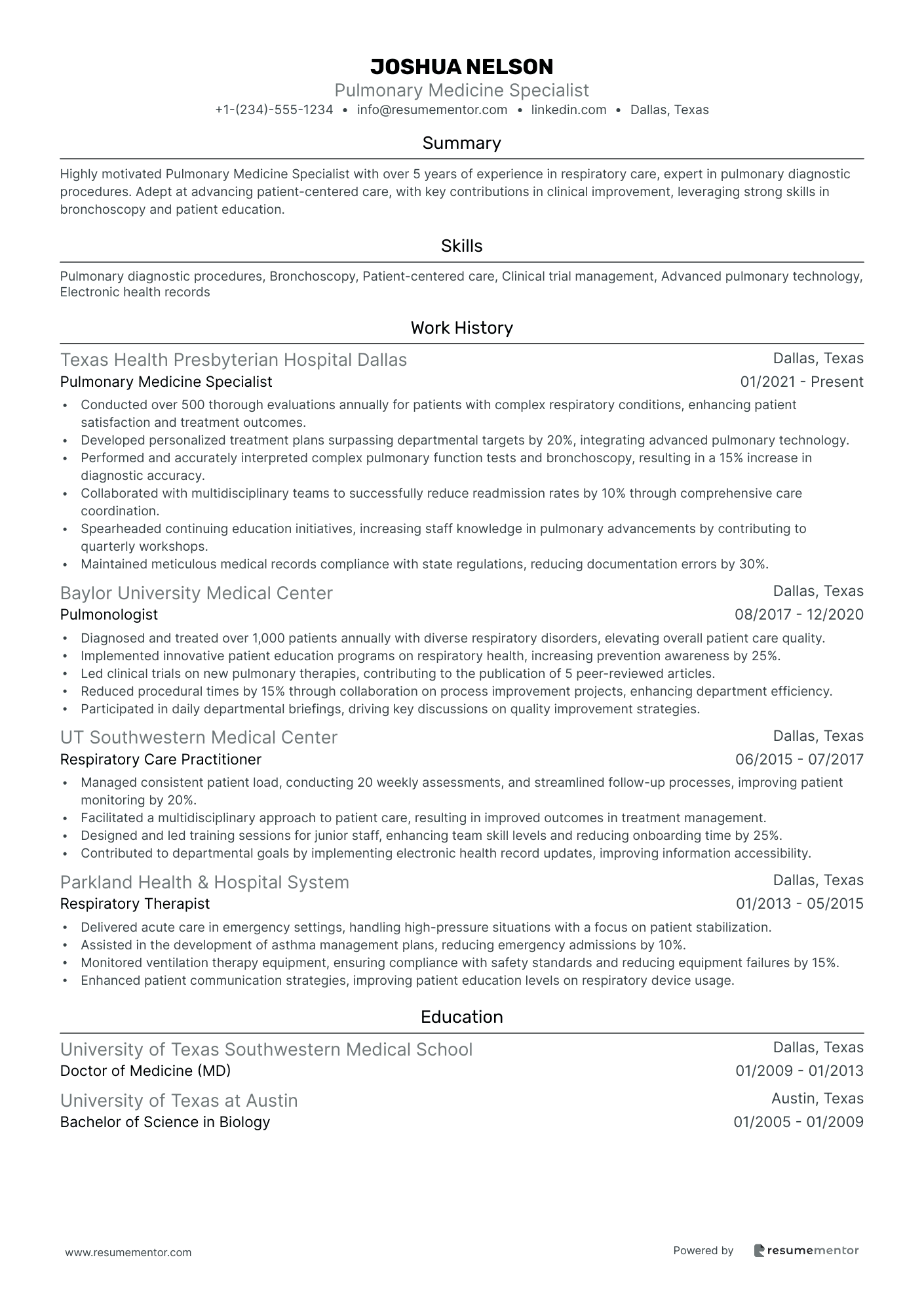
Pulmonary Medicine Specialist
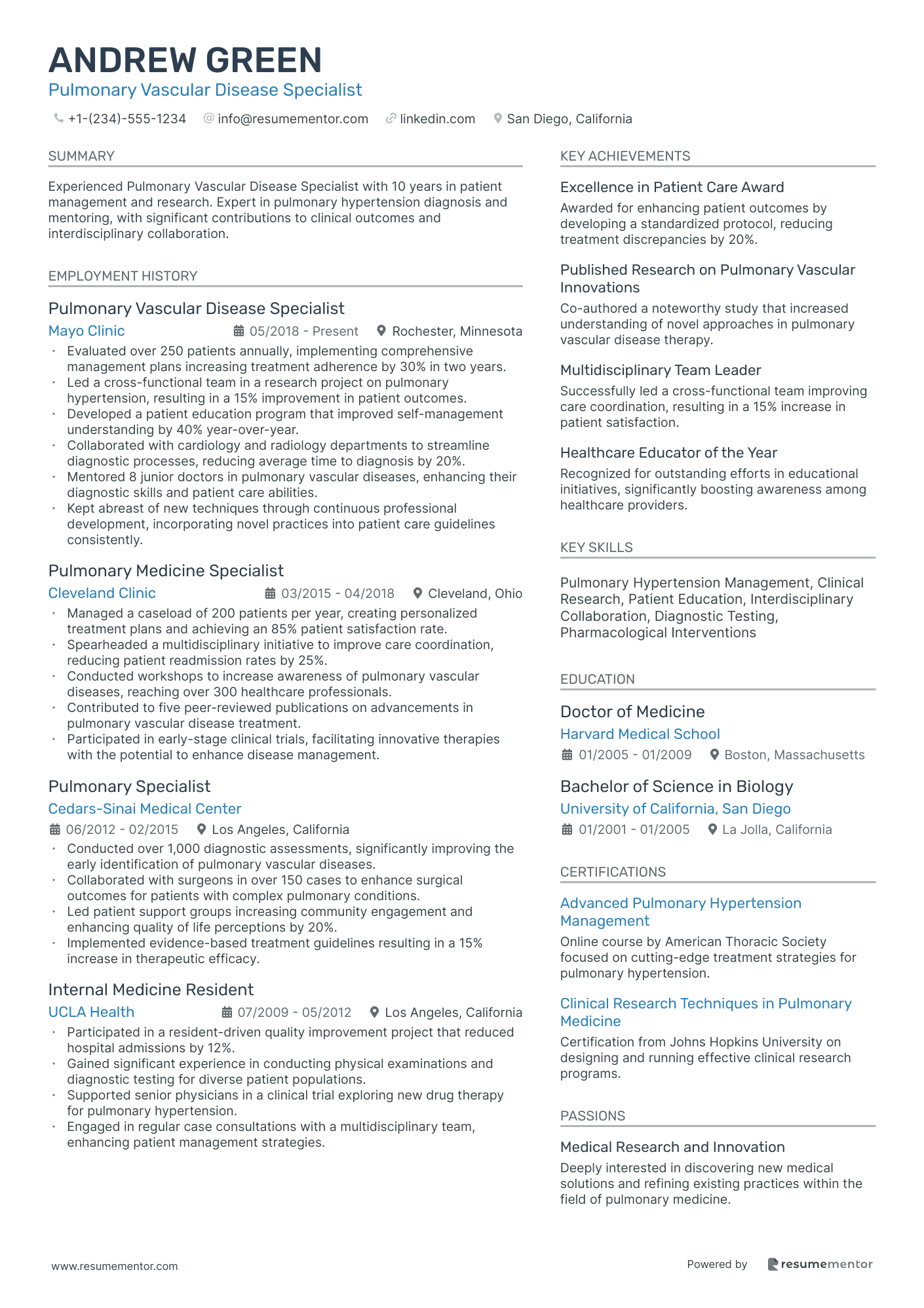
Pulmonary Vascular Disease Specialist
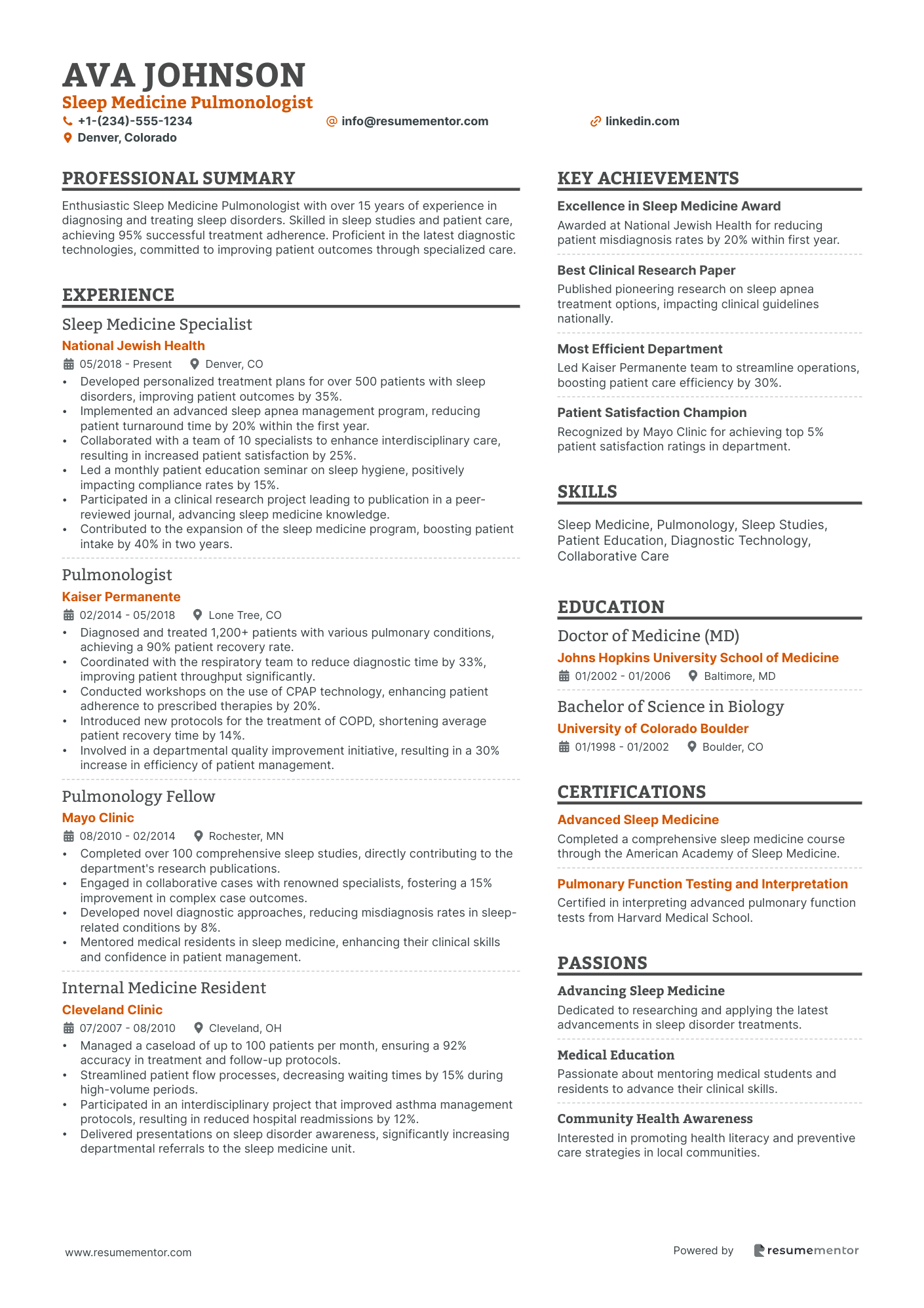
Sleep Medicine Pulmonologist
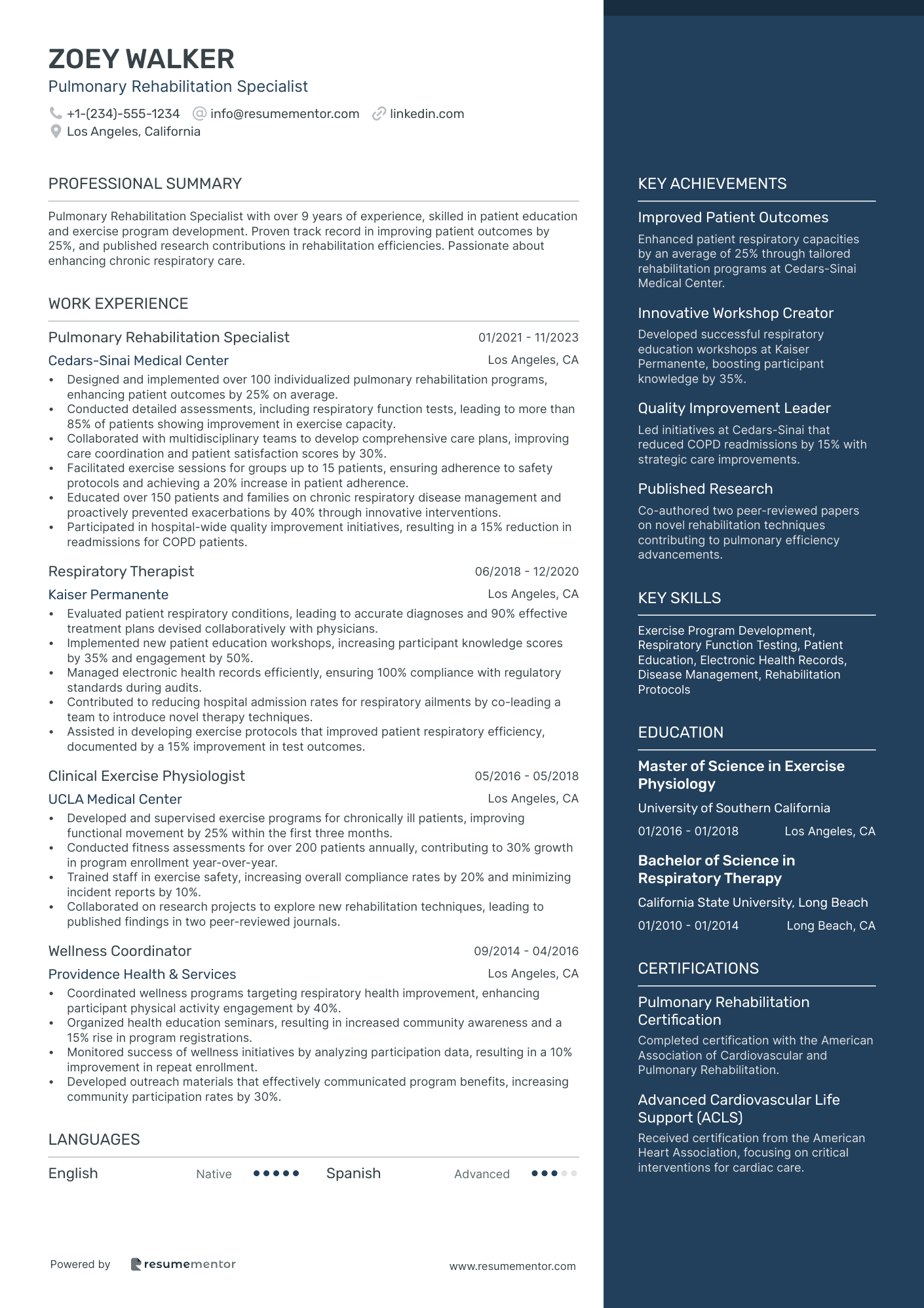
Pulmonary Rehabilitation Specialist
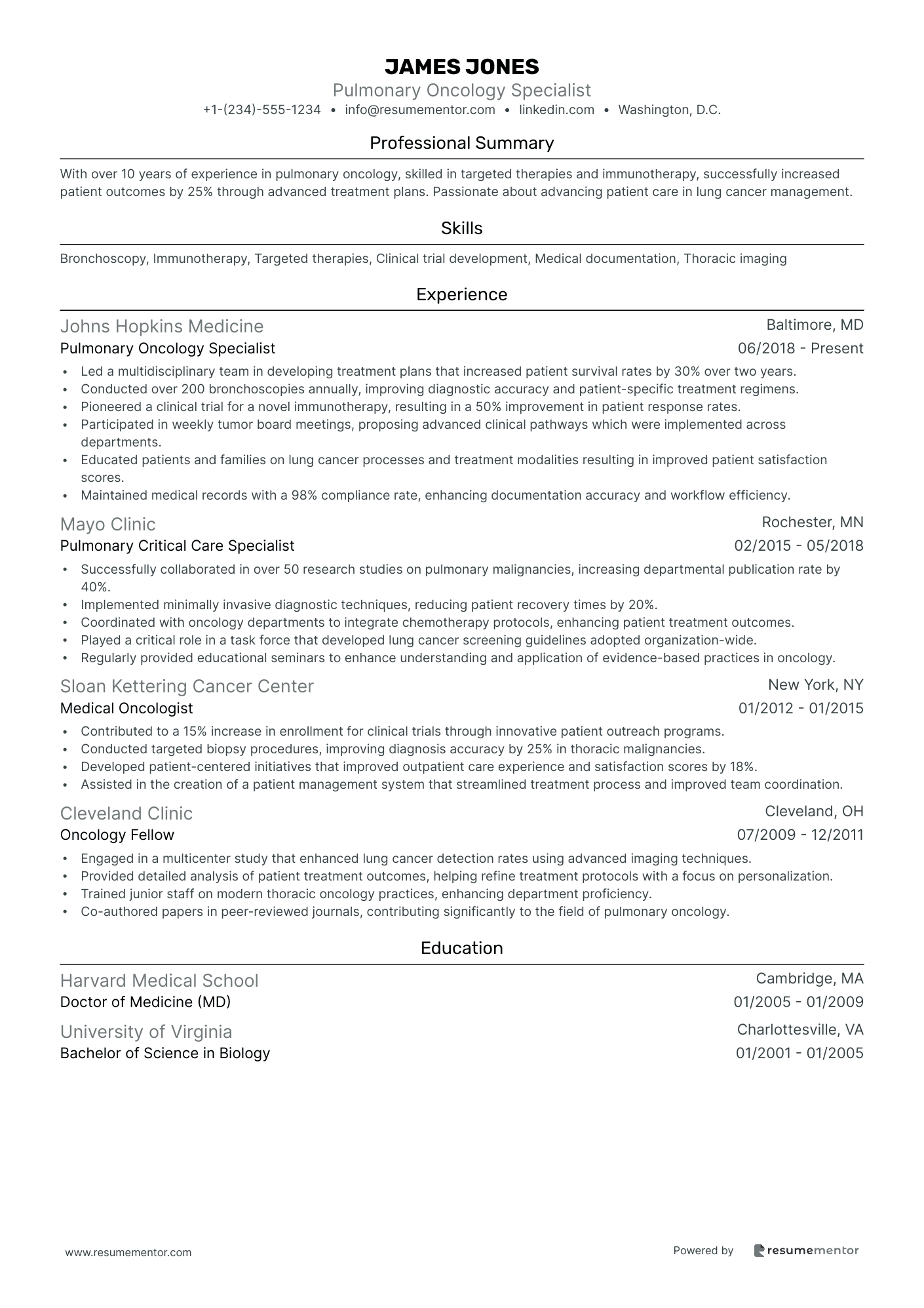
Pulmonary Oncology Specialist
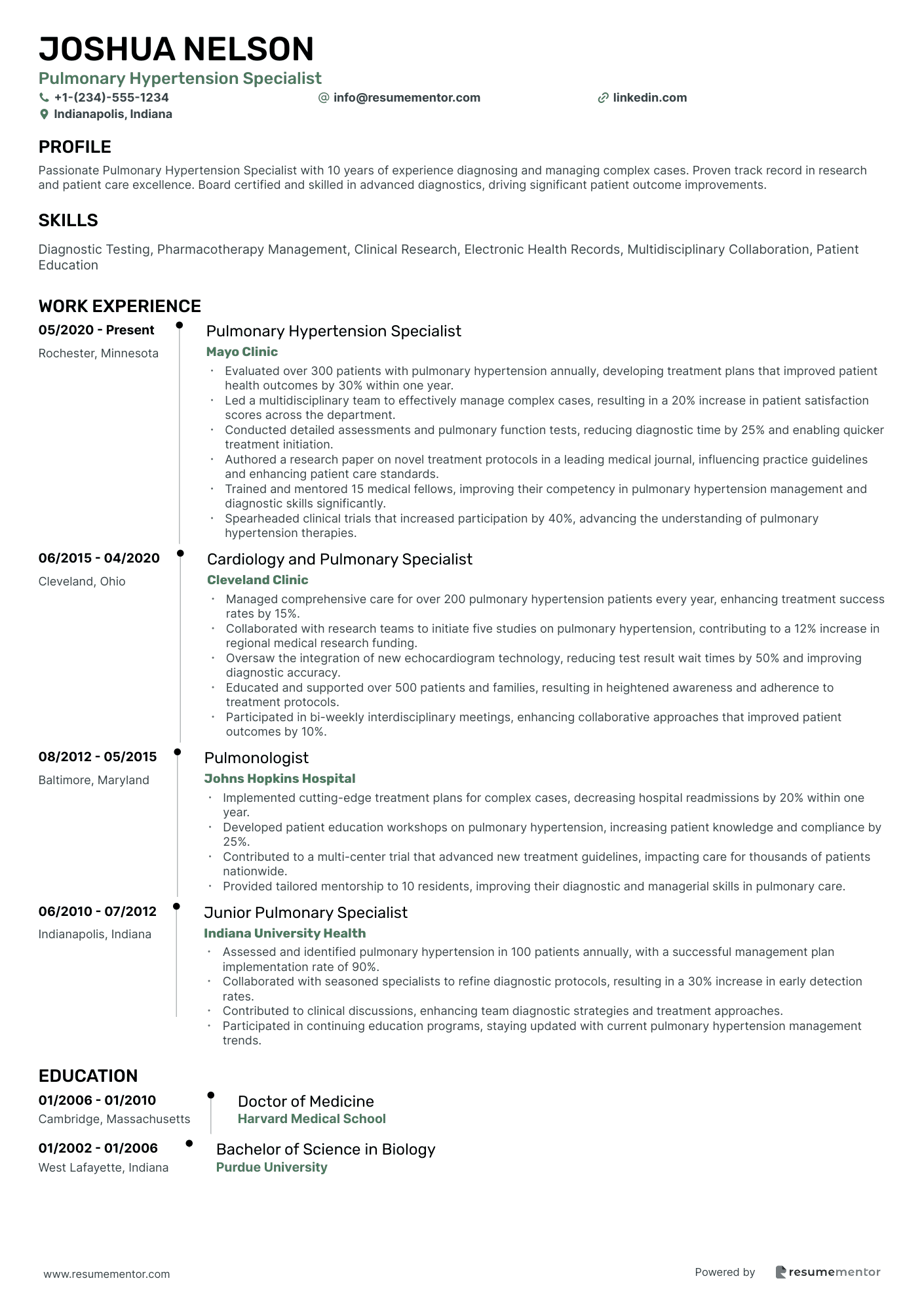
Pulmonary Hypertension Specialist

Pediatric Pulmonologist resume sample
- •Managed treatment plans for over 150 patients annually, resulting in significant improvement in chronic respiratory diseases outcomes.
- •Implemented advanced diagnostic protocols reducing misdiagnosis rates by 10% and enhancing patient care.
- •Led a multidisciplinary team to develop tailored treatment strategies, increasing patient satisfaction scores by 15%.
- •Conducted regular educational sessions for families, increasing their understanding of pulmonary health by 20%.
- •Collaborated on research projects that improved child patient respiratory management initiatives, contributing to published studies.
- •Provided inpatient consultation, achieving a 95% success rate in managing acute respiratory conditions.
- •Developed comprehensive pediatric pulmonology services, increasing patient intake by 25% over two years.
- •Spearheaded the implementation of new clinical guidelines, reducing critical respiratory incidents by 12% in treated children.
- •Enhanced multidisciplinary collaboration, resulting in improved holistic care plans and positive patient feedback.
- •Engaged in outpatient clinic innovations, improving patient processing time by 20% while maintaining high-quality care.
- •Played a critical role in a team that conducted successful clinical trials, broadening treatment options in pediatric pulmonology.
- •Introduced advanced pulmonary function tests, improving diagnostic accuracy for children with complex conditions.
- •Collaborated with a broader healthcare team to enhance respiratory therapy services efficiency, leading to 18% shortened recovery times.
- •Provided mentorship and education to a cohort of 10 residents, enhancing their skills in pediatric pulmonary care.
- •Conducted an extensive patient education program, leading to a 20% increase in patient adherence to treatment protocols.
- •Conducted research on asthma management, resulting in a 15% improvement in patient quality of life scores.
- •Coordinated with cross-functional teams to address complex pulmonary cases, enhancing treatment effectiveness rates.
- •Participated in educational exchanges, sharing insights and advancements from clinical trials in pediatrics.
- •Engaged in comprehensive patient assessments, refining diagnosis protocols and increasing early detection of pulmonary conditions.
Interventional Pulmonologist resume sample
- •Performed over 200 bronchoscopies annually to diagnose complex pulmonary diseases, significantly reducing patient recovery time.
- •Collaborated with a multidisciplinary team to enhance patient care efficiency by 25% through streamlined patient management.
- •Spearheaded a clinical research initiative, leading to a 20% improvement in innovative treatment adoption.
- •Conducted educational sessions for patients and families, achieving a 30% increase in treatment adherence through informed decision-making.
- •Developed and implemented patient care plans incorporating the latest evidence-based interventional techniques, improving patient outcomes by 15%.
- •Maintained accurate and comprehensive patient records, resulting in a 99% documentation completion rate within 24 hours of procedures.
- •Performed over 150 endobronchial ultrasound (EBUS) procedures each year, enhancing diagnostic accuracy by 30%.
- •Led a team in developing a multidisciplinary approach to treating complex pulmonary diseases, improving treatment efficacy by 20%.
- •Engaged in regular outpatient consultations for up to 100 patients per month with complex cases, enhancing patient trust and compliance.
- •Participated in an interdisciplinary research project that resulted in a new protocol adoption, reducing procedure times by 15%.
- •Provided mentorship and training to 10 junior pulmonologists, facilitating a 25% growth in the department’s interventional practice capability.
- •Completed a rigorous fellowship program in Interventional Pulmonology, honing advanced procedural skills.
- •Assisted in over 120 multi-disciplinary team meetings, contributing to enhanced patient care and procedural outcomes.
- •Contributed to a research publication on innovative bronchoscopy techniques, adding to the medical field’s body of knowledge.
- •Demonstrated proficiency in managing up to 10 complex cases weekly, resulting in improved patient satisfaction scores.
- •Managed a diverse caseload of over 50 patients monthly, utilizing advanced pulmonary diagnostic techniques.
- •Collaborated on a project that enhanced bronchoscopy procedural efficiency by 10%, improving department performance.
- •Implemented evidence-based practices, contributing to a 15% reduction in patient readmissions.
- •Facilitated interdisciplinary communication, enhancing care plans and increasing patient outcome satisfaction by 22%.
Transplant Pulmonologist resume sample
- •Led a multidisciplinary team that developed individualized care plans for over 100 transplant patients annually, improving patient satisfaction scores by 20%.
- •Designed and executed a clinical research project that reduced post-transplant complications by 15%, resulting in 10 published papers in peer-reviewed journals.
- •Co-managed the integration of new immunosuppressive protocols, lowering rejection rates from 25% to 15% within the first year.
- •Conducted comprehensive pre-transplant evaluations on over 150 patients annually, effectively determining eligibility and enhancing the transplant success rates.
- •Facilitated weekly transplant care team meetings, promoting collaboration that improved long-term patient outcomes by 18%.
- •Educated patients and their families about transplant procedures, improving understanding and engagement by adopting new educational tools and resources.
- •Oversaw post-operative care for lung transplant patients, achieving a 95% success rate in post-operative recovery management.
- •Collaborated closely with surgical teams to standardize evaluation protocols, leading to a 25% increase in transplant candidate approval rates.
- •Published research findings on advanced lung disease management in three internationally recognized medical journals, enhancing professional reputation.
- •Contributed to patient family education programs, reducing information-related anxiety by deploying tailored communication strategies and content.
- •Implemented novel respiratory therapies that improved patient quality of life scores by 30% in a year-long observational study.
- •Developed management plans for patients with complex respiratory conditions, leading to a 20% decrease in hospital readmission rates.
- •Led workshops for healthcare providers to share best practices in lung disease management, reaching over 200 participants across three sessions.
- •Conducted clinical trials on new respiratory treatments, contributing to advancements in patient care techniques and presenting results at national conferences.
- •Collaborated with a team of researchers to analyze patient data, identifying key factors that predict successful transplant outcomes, enhancing clinical protocols.
- •Executed detailed assessments of lung function in high-risk patients, contributing to tailored treatment plans and improved patient outcomes.
- •Supported the development of a new protocol for managing chronic obstructive pulmonary disease, reducing associated complications by 10%.
- •Participated in a research project focused on biomarkers predictive of organ rejection, enhancing early intervention protocols for transplant recipients.
- •Mentored junior fellows in conducting comprehensive case reviews, ensuring a 90% pass rate in professional certification exams.
Pulmonary Critical Care Specialist resume sample
- •Executed over 150 bronchoscopies annually, improving diagnostic efficiency and reducing diagnosis time by 30%.
- •Led a multidisciplinary team in the Intensive Care Unit, enhancing patient recovery rates by 15% through collaborative care strategies.
- •Played a vital role in developing a new protocol for managing COPD, leading to a 20% improvement in patient outcomes.
- •Spearheaded a clinical research project on interstitial lung disease, resulting in two publications and increased department funding by 10%.
- •Provided comprehensive education to patients and families, enhancing understanding of pulmonary conditions, and improving overall patient satisfaction.
- •Participated in a high-demand on-call rotation, delivering timely consultations and critical interventions with a 98% success rate.
- •Successfully managed a caseload of over 200 pulmonary patients, improving treatment adherence by 25%.
- •Collaborated with healthcare professionals to develop personalized treatment plans, resulting in a 20% increase in treatment success.
- •Designed and implemented a patient education program, reducing hospital readmissions due to asthma exacerbations by 15%.
- •Conducted advanced bronchoscopy procedures, leading to a 98% accuracy rate in lung disease diagnostics.
- •Contributed to the development of a research paper on asthma, which advanced knowledge in pulmonary care and won an award.
- •Managed critically ill patients in the ICU, focusing on respiratory failure with a 90% improvement in survival rates.
- •Performed thoracentesis and intubations regularly, successfully reducing procedural complications by 20%.
- •Led a new initiative for intensive monitoring, reducing ICU stays by an average of 2 days per patient.
- •Developed and taught a critical care procedural course for medical residents, enhancing their skills and confidence in the ICU.
- •Managed acute and chronic illnesses, increasing patient satisfaction scores by 30% in the first year.
- •Provided comprehensive patient consultations, resulting in a 40% increase in office efficiency.
- •Implemented a new electronic health record system, enhancing patient data accuracy and accessibility.
- •Mentored new internal medicine residents, greatly improving their clinical skills and patient interaction abilities.
Pulmonary Medicine Specialist resume sample
- •Conducted over 500 thorough evaluations annually for patients with complex respiratory conditions, enhancing patient satisfaction and treatment outcomes.
- •Developed personalized treatment plans surpassing departmental targets by 20%, integrating advanced pulmonary technology.
- •Performed and accurately interpreted complex pulmonary function tests and bronchoscopy, resulting in a 15% increase in diagnostic accuracy.
- •Collaborated with multidisciplinary teams to successfully reduce readmission rates by 10% through comprehensive care coordination.
- •Spearheaded continuing education initiatives, increasing staff knowledge in pulmonary advancements by contributing to quarterly workshops.
- •Maintained meticulous medical records compliance with state regulations, reducing documentation errors by 30%.
- •Diagnosed and treated over 1,000 patients annually with diverse respiratory disorders, elevating overall patient care quality.
- •Implemented innovative patient education programs on respiratory health, increasing prevention awareness by 25%.
- •Led clinical trials on new pulmonary therapies, contributing to the publication of 5 peer-reviewed articles.
- •Reduced procedural times by 15% through collaboration on process improvement projects, enhancing department efficiency.
- •Participated in daily departmental briefings, driving key discussions on quality improvement strategies.
- •Managed consistent patient load, conducting 20 weekly assessments, and streamlined follow-up processes, improving patient monitoring by 20%.
- •Facilitated a multidisciplinary approach to patient care, resulting in improved outcomes in treatment management.
- •Designed and led training sessions for junior staff, enhancing team skill levels and reducing onboarding time by 25%.
- •Contributed to departmental goals by implementing electronic health record updates, improving information accessibility.
- •Delivered acute care in emergency settings, handling high-pressure situations with a focus on patient stabilization.
- •Assisted in the development of asthma management plans, reducing emergency admissions by 10%.
- •Monitored ventilation therapy equipment, ensuring compliance with safety standards and reducing equipment failures by 15%.
- •Enhanced patient communication strategies, improving patient education levels on respiratory device usage.
Pulmonary Vascular Disease Specialist resume sample
- •Evaluated over 250 patients annually, implementing comprehensive management plans increasing treatment adherence by 30% in two years.
- •Led a cross-functional team in a research project on pulmonary hypertension, resulting in a 15% improvement in patient outcomes.
- •Developed a patient education program that improved self-management understanding by 40% year-over-year.
- •Collaborated with cardiology and radiology departments to streamline diagnostic processes, reducing average time to diagnosis by 20%.
- •Mentored 8 junior doctors in pulmonary vascular diseases, enhancing their diagnostic skills and patient care abilities.
- •Kept abreast of new techniques through continuous professional development, incorporating novel practices into patient care guidelines consistently.
- •Managed a caseload of 200 patients per year, creating personalized treatment plans and achieving an 85% patient satisfaction rate.
- •Spearheaded a multidisciplinary initiative to improve care coordination, reducing patient readmission rates by 25%.
- •Conducted workshops to increase awareness of pulmonary vascular diseases, reaching over 300 healthcare professionals.
- •Contributed to five peer-reviewed publications on advancements in pulmonary vascular disease treatment.
- •Participated in early-stage clinical trials, facilitating innovative therapies with the potential to enhance disease management.
- •Conducted over 1,000 diagnostic assessments, significantly improving the early identification of pulmonary vascular diseases.
- •Collaborated with surgeons in over 150 cases to enhance surgical outcomes for patients with complex pulmonary conditions.
- •Led patient support groups increasing community engagement and enhancing quality of life perceptions by 20%.
- •Implemented evidence-based treatment guidelines resulting in a 15% increase in therapeutic efficacy.
- •Participated in a resident-driven quality improvement project that reduced hospital admissions by 12%.
- •Gained significant experience in conducting physical examinations and diagnostic testing for diverse patient populations.
- •Supported senior physicians in a clinical trial exploring new drug therapy for pulmonary hypertension.
- •Engaged in regular case consultations with a multidisciplinary team, enhancing patient management strategies.
Sleep Medicine Pulmonologist resume sample
- •Developed personalized treatment plans for over 500 patients with sleep disorders, improving patient outcomes by 35%.
- •Implemented an advanced sleep apnea management program, reducing patient turnaround time by 20% within the first year.
- •Collaborated with a team of 10 specialists to enhance interdisciplinary care, resulting in increased patient satisfaction by 25%.
- •Led a monthly patient education seminar on sleep hygiene, positively impacting compliance rates by 15%.
- •Participated in a clinical research project leading to publication in a peer-reviewed journal, advancing sleep medicine knowledge.
- •Contributed to the expansion of the sleep medicine program, boosting patient intake by 40% in two years.
- •Diagnosed and treated 1,200+ patients with various pulmonary conditions, achieving a 90% patient recovery rate.
- •Coordinated with the respiratory team to reduce diagnostic time by 33%, improving patient throughput significantly.
- •Conducted workshops on the use of CPAP technology, enhancing patient adherence to prescribed therapies by 20%.
- •Introduced new protocols for the treatment of COPD, shortening average patient recovery time by 14%.
- •Involved in a departmental quality improvement initiative, resulting in a 30% increase in efficiency of patient management.
- •Completed over 100 comprehensive sleep studies, directly contributing to the department's research publications.
- •Engaged in collaborative cases with renowned specialists, fostering a 15% improvement in complex case outcomes.
- •Developed novel diagnostic approaches, reducing misdiagnosis rates in sleep-related conditions by 8%.
- •Mentored medical residents in sleep medicine, enhancing their clinical skills and confidence in patient management.
- •Managed a caseload of up to 100 patients per month, ensuring a 92% accuracy in treatment and follow-up protocols.
- •Streamlined patient flow processes, decreasing waiting times by 15% during high-volume periods.
- •Participated in an interdisciplinary project that improved asthma management protocols, resulting in reduced hospital readmissions by 12%.
- •Delivered presentations on sleep disorder awareness, significantly increasing departmental referrals to the sleep medicine unit.
Pulmonary Rehabilitation Specialist resume sample
- •Designed and implemented over 100 individualized pulmonary rehabilitation programs, enhancing patient outcomes by 25% on average.
- •Conducted detailed assessments, including respiratory function tests, leading to more than 85% of patients showing improvement in exercise capacity.
- •Collaborated with multidisciplinary teams to develop comprehensive care plans, improving care coordination and patient satisfaction scores by 30%.
- •Facilitated exercise sessions for groups up to 15 patients, ensuring adherence to safety protocols and achieving a 20% increase in patient adherence.
- •Educated over 150 patients and families on chronic respiratory disease management and proactively prevented exacerbations by 40% through innovative interventions.
- •Participated in hospital-wide quality improvement initiatives, resulting in a 15% reduction in readmissions for COPD patients.
- •Evaluated patient respiratory conditions, leading to accurate diagnoses and 90% effective treatment plans devised collaboratively with physicians.
- •Implemented new patient education workshops, increasing participant knowledge scores by 35% and engagement by 50%.
- •Managed electronic health records efficiently, ensuring 100% compliance with regulatory standards during audits.
- •Contributed to reducing hospital admission rates for respiratory ailments by co-leading a team to introduce novel therapy techniques.
- •Assisted in developing exercise protocols that improved patient respiratory efficiency, documented by a 15% improvement in test outcomes.
- •Developed and supervised exercise programs for chronically ill patients, improving functional movement by 25% within the first three months.
- •Conducted fitness assessments for over 200 patients annually, contributing to 30% growth in program enrollment year-over-year.
- •Trained staff in exercise safety, increasing overall compliance rates by 20% and minimizing incident reports by 10%.
- •Collaborated on research projects to explore new rehabilitation techniques, leading to published findings in two peer-reviewed journals.
- •Coordinated wellness programs targeting respiratory health improvement, enhancing participant physical activity engagement by 40%.
- •Organized health education seminars, resulting in increased community awareness and a 15% rise in program registrations.
- •Monitored success of wellness initiatives by analyzing participation data, resulting in a 10% improvement in repeat enrollment.
- •Developed outreach materials that effectively communicated program benefits, increasing community participation rates by 30%.
Pulmonary Oncology Specialist resume sample
- •Led a multidisciplinary team in developing treatment plans that increased patient survival rates by 30% over two years.
- •Conducted over 200 bronchoscopies annually, improving diagnostic accuracy and patient-specific treatment regimens.
- •Pioneered a clinical trial for a novel immunotherapy, resulting in a 50% improvement in patient response rates.
- •Participated in weekly tumor board meetings, proposing advanced clinical pathways which were implemented across departments.
- •Educated patients and families on lung cancer processes and treatment modalities resulting in improved patient satisfaction scores.
- •Maintained medical records with a 98% compliance rate, enhancing documentation accuracy and workflow efficiency.
- •Successfully collaborated in over 50 research studies on pulmonary malignancies, increasing departmental publication rate by 40%.
- •Implemented minimally invasive diagnostic techniques, reducing patient recovery times by 20%.
- •Coordinated with oncology departments to integrate chemotherapy protocols, enhancing patient treatment outcomes.
- •Played a critical role in a task force that developed lung cancer screening guidelines adopted organization-wide.
- •Regularly provided educational seminars to enhance understanding and application of evidence-based practices in oncology.
- •Contributed to a 15% increase in enrollment for clinical trials through innovative patient outreach programs.
- •Conducted targeted biopsy procedures, improving diagnosis accuracy by 25% in thoracic malignancies.
- •Developed patient-centered initiatives that improved outpatient care experience and satisfaction scores by 18%.
- •Assisted in the creation of a patient management system that streamlined treatment process and improved team coordination.
- •Engaged in a multicenter study that enhanced lung cancer detection rates using advanced imaging techniques.
- •Provided detailed analysis of patient treatment outcomes, helping refine treatment protocols with a focus on personalization.
- •Trained junior staff on modern thoracic oncology practices, enhancing department proficiency.
- •Co-authored papers in peer-reviewed journals, contributing significantly to the field of pulmonary oncology.
Pulmonary Hypertension Specialist resume sample
- •Evaluated over 300 patients with pulmonary hypertension annually, developing treatment plans that improved patient health outcomes by 30% within one year.
- •Led a multidisciplinary team to effectively manage complex cases, resulting in a 20% increase in patient satisfaction scores across the department.
- •Conducted detailed assessments and pulmonary function tests, reducing diagnostic time by 25% and enabling quicker treatment initiation.
- •Authored a research paper on novel treatment protocols in a leading medical journal, influencing practice guidelines and enhancing patient care standards.
- •Trained and mentored 15 medical fellows, improving their competency in pulmonary hypertension management and diagnostic skills significantly.
- •Spearheaded clinical trials that increased participation by 40%, advancing the understanding of pulmonary hypertension therapies.
- •Managed comprehensive care for over 200 pulmonary hypertension patients every year, enhancing treatment success rates by 15%.
- •Collaborated with research teams to initiate five studies on pulmonary hypertension, contributing to a 12% increase in regional medical research funding.
- •Oversaw the integration of new echocardiogram technology, reducing test result wait times by 50% and improving diagnostic accuracy.
- •Educated and supported over 500 patients and families, resulting in heightened awareness and adherence to treatment protocols.
- •Participated in bi-weekly interdisciplinary meetings, enhancing collaborative approaches that improved patient outcomes by 10%.
- •Implemented cutting-edge treatment plans for complex cases, decreasing hospital readmissions by 20% within one year.
- •Developed patient education workshops on pulmonary hypertension, increasing patient knowledge and compliance by 25%.
- •Contributed to a multi-center trial that advanced new treatment guidelines, impacting care for thousands of patients nationwide.
- •Provided tailored mentorship to 10 residents, improving their diagnostic and managerial skills in pulmonary care.
- •Assessed and identified pulmonary hypertension in 100 patients annually, with a successful management plan implementation rate of 90%.
- •Collaborated with seasoned specialists to refine diagnostic protocols, resulting in a 30% increase in early detection rates.
- •Contributed to clinical discussions, enhancing team diagnostic strategies and treatment approaches.
- •Participated in continuing education programs, staying updated with current pulmonary hypertension management trends.
Crafting a pulmonologist resume is like building a solid foundation for a skyscraper—each detail needs to support the overall structure effectively. Making sure it accurately reflects your skills in respiratory care can be a challenge, especially when translating clinical expertise into straightforward language. The task of simplifying complex medical terms or highlighting unique contributions often feels overwhelming.
Given the intricacies of the medical field, your resume must clearly convey your ability to manage respiratory diseases. This clarity can be achieved with the help of a good resume template. Templates provide an organized, eye-catching format, ensuring that none of your critical details are overshadowed. You can explore these helpful resume templates to find a format that suits your needs.
With recruiters quickly scanning resumes, it’s crucial to have a layout that highlights your key skills and experience. A well-organized resume increases your chances of catching their attention and earning an interview. Whether you're aiming for a new role or seeking to advance in your career, your resume should clearly reflect your growth and adaptability in the medical field. Adapting the language and tone of your resume for each job you pursue further enhances your chances of making a strong impression.
Key Takeaways
- Crafting a pulmonologist resume involves effectively highlighting clinical skills, patient care, and respiratory disease management in a clear and organized format, with templates providing structure.
- A functional resume format can emphasize specialized skills and achievements, while selecting modern fonts and saving as a PDF maintains a polished look and consistent formatting.
- Structuring experience sections with metrics, action verbs, and alignment to job ads reinforces your fit and enhances the recognition of your expertise by potential employers.
- Showcasing both hard skills, like bronchoscopy procedures, and soft skills, such as effective communication, is vital for demonstrating technical proficiency and personal qualities.
- Including education and certifications, such as board certifications, from recognized institutions highlights your credentials and strengthens your resume in a competitive field.
What to focus on when writing your pulmonologist resume
A pulmonologist resume should effectively convey your expertise in respiratory medicine to the recruiter. It needs to highlight your clinical skills and dedication to patient care, as well as your experience in diagnosing and treating lung conditions. Demonstrating your commitment to staying updated with the latest research and advancements in pulmonology is also important.
How to structure your pulmonologist resume
- Contact Information — Start with your full name, phone number, email address, and LinkedIn profile if applicable, ensuring that all your contact details are current. Accurate and professional contact information allows recruiters to easily connect with you, which is crucial for further engagement. A straightforward presentation of this information not only reflects professionalism but also sets the tone for the rest of the resume.
- Professional Summary — Offer a concise overview of your experience in pulmonology. Emphasize your skills in respiratory care, patient management, and mention your years of practice with any special achievements or recognitions in the field. This section should capture the essence of what you bring to a potential employer, setting the stage for a deeper dive into your qualifications and experiences in the sections that follow.
- Medical Education and Credentials — List your medical degrees, board certifications, and any specialized training in pulmonology. Include details like the institutions you attended and any ongoing education in respiratory medicine. This section highlights the foundation of your expertise, supporting your professional summary with solid qualifications that are critical for establishing your credibility in the field.
- Clinical Experience — Outline your work history with a particular focus on roles and contributions specific to pulmonology. Mention procedures you are skilled in, such as bronchoscopy, and any leadership roles such as directing a pulmonary care unit. This paints a comprehensive picture of your practical expertise and leadership capabilities, providing concrete examples of your proficiency in the field.
- Research and Publications — Detail any research studies you’ve participated in or publications in medical journals. Highlight your contributions to the field of pulmonology, which showcases your engagement with ongoing developments and thought leadership. This section not only underlines your academic involvement but also your ability to influence and advance the practice.
- Professional Affiliations — List memberships with relevant organizations like the American Thoracic Society or the American College of Chest Physicians. This demonstrates your commitment to the professional community and staying informed about industry standards, emphasizing your dedication to lifelong learning and professional development.
As we delve deeper into the resume format, each of these sections will be explored more in-depth to help you craft a compelling pulmonologist resume.
Which resume format to choose
Crafting a top-notch pulmonologist resume is crucial in the medical field, and choosing the right format can make all the difference. A functional resume format focuses on your specialized skills and achievements in pulmonology, allowing you to emphasize critical experiences, such as advanced diagnostic techniques and patient care initiatives, over a chronological work history. This approach ensures your expertise is immediately visible to potential employers who prioritize specialized knowledge.
Complementing this format with the right font can further enhance your resume’s professional appearance. Selecting modern fonts like Rubik, Lato, or Montserrat creates a clean and inviting look. These fonts not only present a contemporary flair but also maintain excellent readability, which is critical when conveying complex medical qualifications and accomplishments.
To maintain this polished appearance across all devices, saving your resume as a PDF is essential. This choice preserves your formatting, ensuring that your carefully structured content remains consistent and intact, regardless of the platform used by hiring managers. Setting your margins to about one inch on all sides is another way to enhance presentation. This standard margin size provides a balanced layout, offering enough white space to guide the reader's eye smoothly through your qualifications without overwhelming them with dense text.
By thoughtfully combining format, font, file type, and margins, you present yourself as both professional and detail-oriented. This cohesive presentation can leave a lasting impression on hiring managers in the healthcare industry, showcasing your attention to detail and commitment to quality, both of which are vital traits in a successful pulmonologist.
How to write a quantifiable resume experience section
A standout experience section in a pulmonologist's resume not only makes you memorable but also effectively highlights your contributions to healthcare organizations. By showcasing your achievements in pulmonary medicine, you demonstrate your expertise and impact. Starting with your most recent job and listing positions in reverse chronological order allows employers to quickly assess your current skills and experience. This clarity is even more crucial when you go back 10-15 years to include relevant work history, ensuring your job titles align with roles you're targeting. Tailoring your resume to the job ad by mirroring its language and focusing on matching experiences reinforces your fit for the position. Action words like "diagnosed," "implemented," "led," and "improved" infuse your achievements with energy and clarity.
- •Diagnosed and treated over 1,200 patients with acute and chronic respiratory conditions annually, increasing patient satisfaction scores by 20%.
- •Implemented a new protocol for COVID-19 management that reduced patient recovery times by 15% and minimized hospital stay durations.
- •Led a team of 10 in a lung cancer detection program, boosting early diagnosis rates by 30%.
- •Improved pulmonary rehabilitation program, resulting in a 25% increase in patient enrollment and engagement.
This experience section delivers powerful results by illustrating tangible achievements. Each bullet point not only highlights your impact on the organization and patient care but also underscores your role in improving healthcare outcomes. By combining critical pulmonologist skills with proven results, your expertise is effectively showcased. The vibrant action verbs energize your accomplishments, making them stand out to employers. Tailoring the content to match employer expectations strengthens the connection between your experiences and the role, facilitating a smoother transition from application to interview. This structured approach crafts your experiences into a compelling narrative of your career and impact.
Result-Focused resume experience section
A result-focused pulmonologist resume experience section should clearly highlight your accomplishments and the positive impact you’ve made. Begin by listing your role, including your job title, where you worked, and the duration of your tenure. Then, effectively demonstrate how your expertise improved patient outcomes and streamlined healthcare processes. Use bullet points to succinctly outline your achievements, choosing action verbs that vividly convey your contributions.
Connecting each bullet point to the overall impact ensures a cohesive narrative in your resume. Illustrate how managing a large volume of patients led to improved care, or how implementing new protocols significantly reduced emergency visits. If your efforts resulted in higher patient satisfaction or more efficient operations, highlight these as direct outcomes of your work. Maintaining simple yet professional language helps make your value immediately clear to recruiters, emphasizing how your skills have made a tangible difference in previous roles.
Pulmonologist
City Health Hospital
June 2018 - Present
- Led a team of specialists in managing and treating over 1,500 patients with chronic respiratory conditions, enhancing overall care.
- Developed a new protocol for asthma management, resulting in a 30% reduction in emergency visits, showing the effectiveness of strategic care adjustments.
- Increased overall patient satisfaction scores by 20% through enhanced communication and personalized care plans, highlighting a commitment to patient-centered care.
- Implemented an in-house training program for junior doctors to improve diagnostic accuracy and treatment efficacy, fostering a culture of continuous learning and improvement.
Innovation-Focused resume experience section
An innovation-focused pulmonologist resume experience section should effectively showcase your unique contributions and breakthroughs in the field. Start by summarizing your role and the innovative projects you've driven or been involved in, emphasizing advancements such as improved patient outcomes or increased diagnostic efficiency. It's important to incorporate specific metrics to highlight the impact of your work. Mention the skills or technologies you've used, especially those that apply to future roles, to create a coherent narrative of your capabilities.
When detailing your experiences, focus on clarity and cohesion. Use bullet points to outline your achievements, ensuring each illustrates your ability to innovate and enhance patient care. The objective is to create a seamless and compelling story that reflects your expertise and forward-thinking nature, demonstrating how you effectively push boundaries to develop better health solutions.
Pulmonologist
St. Mary's Health Center
Jan 2019 - Present
- Implemented a new telemedicine system that reduced patient follow-up time by 30%.
- Developed a predictive analytics tool to identify patients at risk, improving early diagnosis accuracy by 15%.
- Led a project to integrate AI technology in sleep study analysis, resulting in a 25% increase in diagnostic efficiency.
- Collaborated with multidisciplinary teams to create a patient education program, enhancing treatment adherence by 20%.
Efficiency-Focused resume experience section
An efficiency-focused pulmonologist resume experience section should clearly highlight how your initiatives have led to improvements in medical processes, patient outcomes, and time management. Begin by pinpointing key projects or tasks where your efforts have resulted in noticeable successes, such as reducing patient wait times or enhancing treatment protocols. By incorporating clear metrics, you demonstrate your impact in a straightforward and concise manner.
Dive into the specifics of each role, focusing on the outcomes and efficiency improvements you’ve achieved. This involves showcasing your ability to streamline operations and introduce innovative methods in pulmonary care. Such a portrayal emphasizes your expertise in the field and presents you as someone dedicated to elevating healthcare services.
Pulmonologist
City General Hospital
June 2018 - Present
- Reduced average patient wait times by 30% through improved scheduling systems.
- Enhanced pulmonary rehabilitation protocols, increasing patient recovery rates by 20%.
- Implemented a telemedicine program that increased access to rural patients by 40%.
- Developed training for junior staff that decreased errors in pulmonary function tests by 15%.
Leadership-Focused resume experience section
A leadership-focused pulmonologist resume experience section should effectively showcase your ability to guide teams, initiate projects, and optimize healthcare outcomes. Begin by identifying specific leadership roles or tasks you have undertaken, such as directing a team or leading a significant project. This sets the stage for highlighting achievements that demonstrate your decision-making and problem-solving skills, as well as your capacity to inspire others. Be precise in illustrating examples and outcomes, as this conveys the real impact of your leadership while balancing it with your technical expertise.
Reflect on what future employers or organizations value; they are often keen on tangible results and evidence of previous successes. If you’ve directed a team on a crucial pulmonary research project, detail your role in meeting project objectives and timelines. When listing bullet points, ensure they are clear and succinct, initiating each with an action verb and incorporating measurable achievements. Words like "improved," "developed," and "led" efficiently convey your leadership strengths. Make sure each bullet point offers a unique insight and captures different dimensions of your leadership abilities.
Chief Pulmonologist
City Health Hospital
January 2020 - Present
- Led a team of six pulmonologists in a multi-center research study, resulting in a 30% reduction in asthma-related ER visits.
- Developed and implemented new training protocols for junior pulmonologists, improving diagnostic accuracy by 20%.
- Chaired the hospital’s Pulmonary Excellence Committee, successfully advocating for a $500,000 grant to upgrade equipment.
- Driven patient care improvements through initiative development, increasing patient satisfaction scores by 15%.
Write your pulmonologist resume summary section
A pulmonologist-focused resume summary should capture the essential skills and experiences with clarity and impact. For those well into their careers, this section offers a glimpse into your expertise and contributions. Consider this example:
The example stands out because it not only demonstrates your expertise but also underscores the tangible impact you've made, like advancing patient care and showcasing leadership skills. As you write your summary, consider emphasizing the core qualifications and exclusive contributions you've made in your field.
To describe yourself effectively, ensure your language is strong and paints a vivid picture of your professional journey, backed by specific achievements. Unlike a summary, a resume objective focuses on future aspirations and is generally used by those new to the field or making a career switch. While a resume profile and a summary of qualifications can serve similar purposes, they differ slightly; a profile offers a broader view, and a summary of qualifications often showcases achievements in bullet points. Choose the format that best aligns with your experience level and the job requirements to ensure it resonates with what the employer values.
Listing your pulmonologist skills on your resume
A skills-focused pulmonologist resume should clearly highlight your abilities and expertise. Your skills can either have their own dedicated section or be seamlessly integrated into your experience and summary areas. It's vital to bring attention to strengths and soft skills, such as empathy and communication, as these are essential in patient interactions. Simultaneously, hard skills are your technical capabilities, like interpreting pulmonary tests or managing respiratory diseases, which are crucial for the role.
Considering these skills and strengths as resume keywords can make your resume more noticeable to employers and automated systems. Keywords are the specific terms employers look for to identify the right candidate for a pulmonology position, reinforcing that you have the specific qualifications they seek.
Here's an example of an effective standalone skills section:
This skills section excels because it's concise and targeted towards what a pulmonologist needs to demonstrate. By listing specific skills, you underline your expertise and readiness to handle the demands of the job. Including relevant terminology assures employers of your capability.
Best hard skills to feature on your pulmonologist resume
Your hard skills are a testament to your technical proficiency in pulmonology. They convey to potential employers your ability to perform essential, specialized tasks within the field.
Hard Skills
- Bronchoscopy procedures
- Respiratory disease management
- Pulmonary rehabilitation
- Critical care medicine
- Lung function testing
- Ventilator management
- Sleep study analysis
- Asthma management
- COPD treatment
- Interpreting chest X-rays
- Managing cystic fibrosis
- EBUS (Endobronchial Ultrasound)
- Thoracentesis
- Providing smoking cessation
- Allergy testing
Best soft skills to feature on your pulmonologist resume
Soft skills reflect your personal qualities and how you interact with patients and colleagues. They highlight your capacity to work empathetically and collaboratively in healthcare settings.
Soft Skills
- Effective communication
- Empathy and patient care
- Team collaboration
- Problem-solving
- Decision-making
- Adaptability
- Time management
- Leadership
- Emotional intelligence
- Attention to detail
- Conflict resolution
- Stress management
- Patience
- Cultural competence
- Active listening
How to include your education on your resume
An education section is a critical part of your resume. It showcases your qualifications and signals to employers that you are well-prepared for the pulmonologist role. Tailor this section to the job you are applying for; only include relevant education. Listing your GPA can highlight your academic strength if it is impressive, say above 3.5. Mention any honors, such as cum laude, directly following your degree. Properly list your degree by stating the degree type, followed by the field of study.
Wrong Example:
Right Example:
The second example stands out as it highlights education directly related to being a pulmonologist. It includes the Doctor of Medicine degree, reflects a high academic achievement through cum laude honors, and provides a strong GPA from a prestigious institution. Focusing on relevant credentials increases your chances of getting noticed by recruiters.
How to include pulmonologist certificates on your resume
Including a certificates section in your pulmonologist resume is essential. List the name of the certificate first. Include the date you obtained it. Add the issuing organization, which gives more credibility. You can also feature key certificates in the header to grab immediate attention. For example, "Board Certified Pulmonologist, American Board of Internal Medicine."
The example is good because it is clear and relevant. It shows you are qualified. It includes well-known organizations in the field. The certificates listed are highly relevant to pulmonology. A potential employer can quickly see your qualifications and trust in your expertise. It also ensures your resume stands out in a competitive field. This makes you a more attractive candidate for the job.
Extra sections to include in your pulmonologist resume
As a pulmonologist, your resume is a crucial tool to highlight your expertise and experience in the medical field. To make your resume stand out, consider incorporating several sections that can provide a well-rounded view of your skills and interests.
- Language section—Showcase your multilingual abilities to demonstrate effective communication with diverse patient groups, which is highly valuable in a healthcare setting. Include any languages you are fluent in to show additional skills beyond medical expertise.
- Hobbies and interests section—Highlight your personal interests, which can show your personality and work-life balance, making you more relatable and personable to potential employers. Choose hobbies that reflect skills or qualities that can be beneficial in your profession.
- Volunteer work section—Emphasize your community involvement and dedication to helping others, which can show your compassionate side and commitment to healthcare. Volunteer work can also provide additional experience relevant to your medical career.
- Books section—List medical publications or books you have authored or contributed to showcase your expertise and thought leadership in pulmonology. This section can strengthen your resume by demonstrating your knowledge and willingness to educate others.
Including these sections can make your resume more comprehensive and appealing to prospective employers. They provide a more detailed picture of who you are beyond your professional qualifications. Be sure that all sections complement each other and contribute to a cohesive professional narrative.
In Conclusion
In conclusion, crafting a pulmonologist resume demands attention to detail and a focus on your unique skills. Using a structured format ensures that your qualifications are clear to recruiters, helping you stand out in a competitive field. Tailor each section to highlight your expertise in respiratory care, from clinical experience to research contributions. Don't underestimate the power of a well-written summary; it captures your career highlights and sets the stage for the rest of your resume. Including both hard and soft skills showcases your technical abilities and interpersonal strengths, vital for a healthcare professional. Displaying certificates proves your dedication to continued learning and adherence to industry standards. Consider adding extra sections to reflect your personal interests and community involvement, rounding out your professional profile. This comprehensive approach not only enhances readability but also demonstrates your meticulous nature and readiness for new challenges. Present your qualifications with clarity and confidence, portraying yourself as a dedicated and knowledgeable pulmonologist. By doing so, you increase your chances of making a lasting impression and securing the position you desire. Always remember, a well-crafted resume is your first opportunity to connect with potential employers, so make each word count.
Related Articles

Continue Reading
Check more recommended readings to get the job of your dreams.
Resume
Resources
Tools
© 2026. All rights reserved.
Made with love by people who care.

